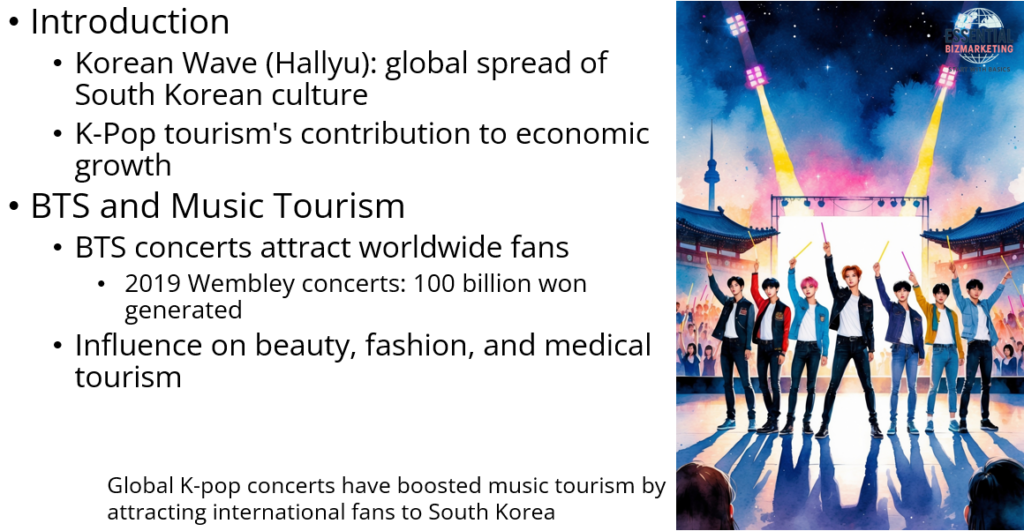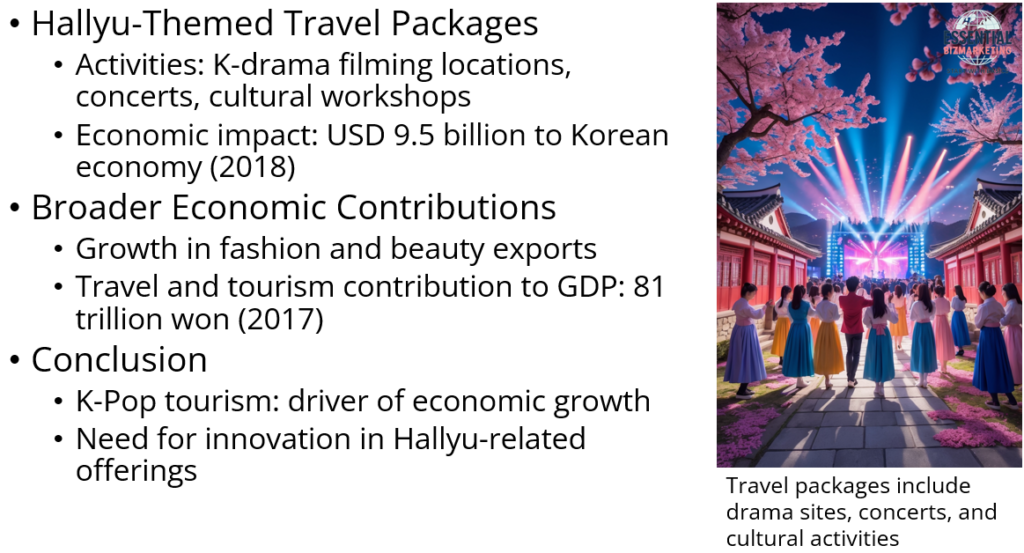Introduction: The Rise of Hallyu and Its Influence on Tourism

The Korean Wave, or Hallyu, refers to the global proliferation of South Korean culture, encompassing music, television dramas, films, and more. A significant facet of this phenomenon is K-Pop, which has not only captivated global audiences but also substantially influenced South Korea’s tourism industry. This article explores how K-Pop tourism, exemplified by phenomena like BTS tours and Hallyu-themed travel packages, has contributed to economic growth.
BTS and the Surge in Music Tourism
BTS, one of South Korea’s most prominent K-Pop groups, has played a pivotal role in boosting music tourism. Their global concerts have attracted fans worldwide, leading to increased tourist inflows. For instance, their 2019 concerts at Wembley Stadium in London generated approximately 100 billion won, highlighting the group’s substantial economic impact beyond South Korea. Furthermore, BTS’s influence extends to various sectors, including beauty, fashion, and even medical tourism, where K-Pop stars significantly affect trends.
Hallyu-Themed Travel Packages and Economic Benefits

The popularity of K-Pop has led to the development of Hallyu-themed travel packages, attracting international tourists eager to experience South Korean culture firsthand. These packages often include visits to filming locations of popular K-dramas, attendance at K-Pop concerts, and participation in cultural workshops. According to the Korea Foundation for International Cultural Exchange, Hallyu contributed approximately USD 9.5 billion to the Korean economy in 2018, underscoring its significance in tourism and related industries.
Broader Economic Contributions of K-Pop Tourism
Beyond direct tourism revenue, K-Pop has spurred growth in various related sectors. The fashion and beauty industries, for instance, have benefited from the global interest in K-Pop idols, leading to increased exports of Korean cosmetics and apparel. Additionally, the surge in tourism has positively impacted South Korea’s hospitality and retail sectors, contributing to the nation’s overall economic growth. In 2017, the total contribution of travel and tourism to South Korea’s GDP amounted to approximately 81 trillion South Korean won, illustrating the sector’s significance to the economy.
Conclusion: Sustaining Growth in K-Pop Tourism
The fusion of K-Pop and tourism has proven to be a potent driver of economic growth for South Korea. As the global fascination with Korean culture continues, it is imperative for stakeholders to innovate and diversify Hallyu-related offerings. By doing so, South Korea can sustain and potentially amplify the economic benefits derived from this cultural phenomenon.
📚 References
Martin Roll Company. (2021, June 10). Korean Wave (Hallyu) – The rise of Korea’s cultural economy & pop culture. https://martinroll.com/resources/articles/asia/korean-wave-hallyu-the-rise-of-koreas-cultural-economy-pop-culture/
Statista Research Department. (2018, March 15). Total contribution of travel and tourism to GDP in South Korea from 2011 to 2028 (in trillion South Korean won). Statista. https://www.statista.com/statistics/646922/south-korea-economic-impact-of-travel-and-tourism/
Stoa Daily. (2023, May 12). BTS of K-pop. https://daily.stoa.com/newsletter/bts-of-k-pop
Wikipedia contributors. (2024, July 30). Cultural impact of BTS. In Wikipedia, The Free Encyclopedia. https://en.wikipedia.org/wiki/Cultural_impact_of_BTS
📁 Start exploring the Blog
📘 Or learn more About this site
🧵 Or follow along on X (Twitter)
🔎 Looking for sharp perspectives on global trade and markets?
I recommend @GONOGO_Korea as a resource I trust and regularly learn from.
